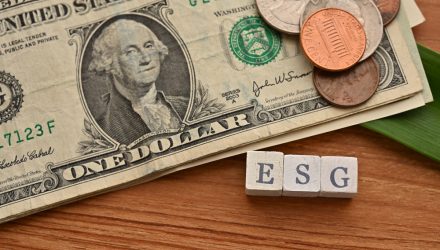Advisors and investors often ponder whether embracing environmental, social and governance (ESG) strategies means leaving upside on the table. These days, the primary concern could be shifting to this question: can ESG ETFs offer some downside protection?
At the very least, ESG ETFs, including the FlexShares STOXX US ESG Impact Index Fund (CBOE: ESG) and its global counterpart, the FlexShares STOXX Global ESG Impact Index Fund (CBOE: ESGG), can use the current weakness in equities to prove to investors they won’t overshoot broader benchmarks on the downside when markets tank.
ESGG is based on the STOXX Global ESG Impact Index, which screens companies scoring better with respect to a select set of ESG key performance indicators (KPIs), with the bottom 50% of such companies based on their ESG KPI scores excluded from the Index, as are companies that do not adhere to the UN Global Compact principles, are involved in controversial weapons or are coal miners.
“The Bloomberg SASB U.S. Large Cap ESG Index has minimal exposure to fossil-fuel companies but still dropped as much as 7.2% on Monday, almost matching the 7.4% decline of the benchmark Standard & Poor’s 500 Index. The ESG gauge has plunged 17.7% from its peak on Feb. 19, compared with the S&P 500’s 16.7% slump,” reports Bloomberg.
Making An ESG Evaluation
ESG’s index is an optimized index designed to provide broad market exposure that is tilted toward U.S. companies that score better with respect to a small set of ESG characteristics and to provide the potential for attractive risk-adjusted performance relative to the STOXX® USA 900 Index, as determined by the index provider. This month, ESG’s decline is in line with that of the S&P 500.
“Fear gripping investors could provide a crucible for ESG funds, most of which have never faced a bear market,” according to Bloomberg. “What’s more, most managers have never had their commitment to environmental or social concerns run into the pressures of falling prices and panicked clients.”
The growth of ESG funds is not relegated to simply growing in size, but the actual definition is expanding as well. While climate and sustainability still dominate topically, factors like health and wellbeing benchmarks have been formally added to the GRESB Real Estate Assessment (the ESG benchmark used by the real estate industry worldwide).
Year-to-date, ESG, the FlexShares ETF, has performed slightly less poorly than the S&P 500.
For more on multi-asset strategies, please visit our Multi-Asset Channel.
The opinions and forecasts expressed herein are solely those of Tom Lydon, and may not actually come to pass. Information on this site should not be used or construed as an offer to sell, a solicitation of an offer to buy, or a recommendation for any product.

